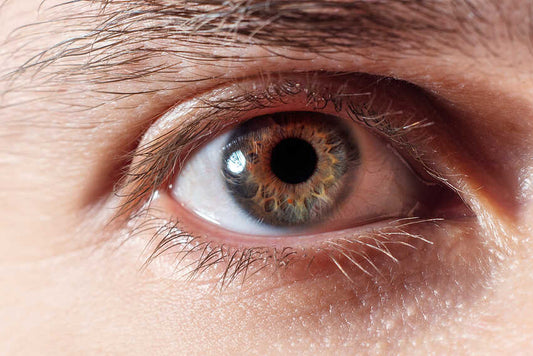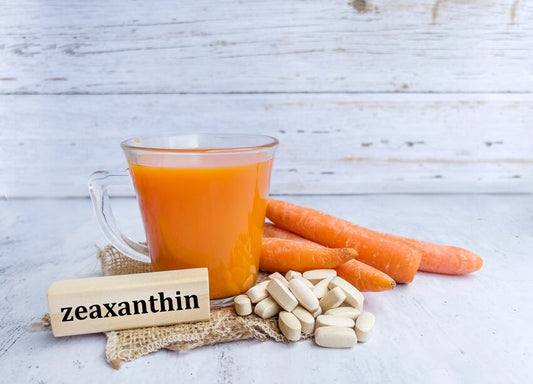Bilberries have a number of myths surrounding their potent eyesight benefits—but what’s real?Today, we’re going to discuss the various ways bilberries can help your eye health, as well as the historical misconception of their powers over night vision—and what the research has to say about these healthy little berries.
Risks To Eyes—Aging, Decay, And Loss
As we age, we open our eyes up to the risk of degeneration and decay. These are the characteristics of many of the major problems that eyes have—macular degeneration, cataracts, glaucoma, and other issues are centered on degenerating function.
So, when we talk about benefits for the eyes, many of the things we’re going to look at are protective effects. If you’ve already got eyes that work and don’t experience vision loss, then what you want is maintenance of that function as you age!
These risks stack up as we age, and the development of eye problems can be a huge change to the way that you live your life. It’s not only fundamentally scary to lose your senses, but also risks your ability to live independently if it gets particularly nasty in later life.
Bilberry Extract - An Overview
Bilberry is a specific form of European blueberry cultivar—a type of plant that offers a wide array of health and wellbeing benefits.
There are many reasons to love blueberries and bilberries, but specifically, we are talking about their role in eye health. The interesting thing about bilberries is that they offer both improvement of eyesight and protection in the long run.
These add up to make bilberries an easy-access and versatile eye health food. It does not hurt that they’re also a great source of healthful compounds like anthocyanins which is a powerful antioxidant, brain-protective compound, cardiovascular health, and even acute cognitive performance.
So, when we talk about bilberries, there are a few functions that take precedence. It’s worth understanding these so you can make the most of them:
- Antioxidant: reduces the risk of damage to cells by preventing the negative effects of oxidative damage. This is found all over the body but specifically applies to the eyes because they’re sensitive to oxidative damage.
- Neuroprotective: eyesight and cognition are closely related, and the effects of blueberries on memory are primarily demonstrated in visual memory tests.
- Immune booster: blueberries improve immune function and the regulated release of natural killer cells—especially in response to exercise and activity.
- Insulin control: blueberries show some signs of controlling insulin levels and improving kinetics in older people. Interestingly, they may inhibit crucial enzymes in the insulin-action process.
- Muscle damage: some studies suggest that muscular response to exercise—like natural killer cell function—is improved markedly. This suggests a protective effect on many kinds of cells.
- Arterial stiffness: anthocyanins in blueberries help reduce arterial stiffness—a key factor in many vascular diseases. The eyes are susceptible to vascular damage and degeneration.
- Blood pressure: blueberries reduce blood pressure through a number of mechanisms including antioxidant, insulin-control, and arterial stiffness effects.
How Does It Benefit Eyes?
First and foremost, there’s a stubborn rumor that bilberries help provide night vision. That’s just as much a myth as the old one about carrots helping you see in the dark.
Rather, where they seem to improve vision quality is when combined with Beta-carotene and vitamin E. This is also not likely to give you superhuman vision powers—but rather to address the vision-quality losses associated with deficiency.
Should you consider a diet with more vitamin A and E, with bilberries? Yes. Is it going to turn you into some sort of hawk-eyed superhero? Not likely.
Learn more about bilberry benefits and dosage for eyes.
Antioxidant Effect
The antioxidant effect of bilberries is where they’re most effective and important.
Anthocyanins in bilberries and blueberries are powerful antioxidants and reduce the risk of degeneration in cells. Macula and retina cells are particularly at risk from this kind of decline, making bilberries a great choice for supporting their longevity.
The main benefit is reducing DNA damage in these cells and supporting healthy repair following metabolic and mechanical stress. Antioxidant effects contribute to overall wellbeing in the body itself and local benefits to the cells in the eyes.
For example, reducing inflammatory pro-oxidative processes can modestly improve things like insulin levels and reaction, reduce arterial stiffness, lower blood pressure, and indirectly contribute to eye health and wellbeing.
The antioxidant effects of bilberries are powerful and versatile. For that reason alone, they should play a role in your diet!
AMD-Benefits: Antioxidant but Also Vascular Wellbeing
The combined benefits of antioxidant and vascular function associated with bilberries are both interesting for macular degeneration.
This is a condition associated with the long-term decay and degeneration of cells at the back of the eyes. These are sensitive to oxidative and blood-pressure-related damage, with some forms being incurable and progressive.
Bilberries are one example of how lifestyle factors like nutritional choices contribute to slowing down macular degeneration. Proper anti-oxidative, anti-hypertension nutrients and vitamins offer a form of protective influence to these delicate, crucially important cells.
Lowering Eye Pressure
When we come back to the vascularity of eyes and the role they play in pain, discomfort, and functional loss with time.
Conditions like glaucoma and cataracts are directly tied to pressure in the eyes, while macular degeneration is also reliant on this kind of excessive pressure. Eyes are sensitive and excessive pressure produces damage and degeneration at an accelerated rate.
Bilberries seem to relieve some of this pressure through both the changes they provoke in arterial stiffness, capillary action, and their potential effects on insulin levels. These play an important role in how bilberries protect your eyes—even modestly.
A-Glucosidase Inhibitor and Diabetes-Relief? Controversial
One of the controversial claims around bilberries and blueberries includes their effect on insulin reaction, regulation, and resistance.
Bilberry intake seems to produce an inhibitor to a digestive enzyme called A-glucosidase, which breaks carbohydrates down during digestion to absorb them for energy. This means, obviously, that you have a slightly muted response to carbohydrates.
The real question with it is if this is significant enough to notice a difference. It’s important to remember there’s a difference between the theory of what should work and what actually makes changes in the real world.
Blue-Light Protective and Eye Strain
Bilberries also seem to be indirectly associated with the sleep quality and restitution of the eyes through their effect on blue light protection.
This is an interesting way of reducing the negative effects of both NET and blue light in the evenings as it affects sleep quality. These are also associated with the stress placed on macula and retina cells throughout the day, which may help improve the balance of degeneration to recovery.
There’s very little research on the real-world implications of these effects, but they’re definitely interesting as a synergy with the more well-understood mechanics mentioned above.
In summary….
Bilberries are delicious, healthful, eye-protecting fruit. There’s no reason not to love how easy and effective they are for controlling health and protecting your cells.
Bilberries are an excellent example of how nutritional choices are a significant player in your health and how the things you do determine how you age and how you feel.
They are one of many foods and supplements that offer long-term benefits to general health, and eyesight specifically.
There’s no bad time to be more proactive with your food choices and improve your diet!
References
- Aging and eye conditions: https://doi.org/10.1167/iovs.13-12789
- Bilberry characterization: https://doi.org/10.1016/S0168-9452(97)00241-0
- Anthocyanin action in various fruits: https://doi.org/10.1016/j.nut.2015.04.015
- What anthocyanin is and what it does: https://doi.org/10.3390/molecules23081970
- A-Glucosidase interactions: https://doi.org/10.1515/folmed-2017-0028
- Do bilberries affect night vision?: https://doi.org/10.1016/j.survophthal.2003.10.006















